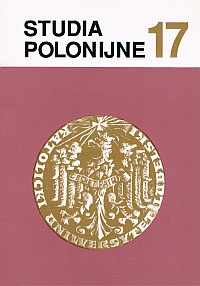Der alte polnische Redensführer. Leon I Schedlin-Czarliński (1835-1918) a Senior of Polish Parliament Members in Germany (The 160th Anniversary of his Birthday)
Main Article Content
Abstract
Leon I Schedlin-Czarliński (1835-1918), a landowner and Polish national activist in Pomerania, was the most outstanding representative of the Schedlin-Czarliński family in its over six-century long history. He was brought up in a patriotic and religious atmosphere, which pervaded his home. Throughout his life he defended the people, was a loyal and exemplary son of the Catholic Church. In 1948 he took part in the Poznań rising. He taught in the secondary schools in Chojnice and Chełmno, where he belonged to the Philomathians, a secret society. He studied philosophy, law and economics at Wrocław University, where he was an active member of the Literary-Slavonic Society. He earned his law diploma at Berlin University in 1859.
In 1861 he married Bronisława Mazowiecka (1838-1914), the heiress to Zakrzewko (Toruń district). The knight's property of Zakrzewko had remained in the hands of the Schedlin Czarliński family until 1945.
Leon Schedlin-Czarliński, under the pseudonym of Budrys, took a very active part in the January rising (1863-1864). He belonged to the close command in West Prussia, holding in Romuald Traugutt's government the function of the Chełm governor.
After the rising he was made victim of repressive measures. Immediately as they ceased, Leon Schedlin-Czarliński committed himself permanently to the cause of the Polish representation in the Prussian Seym and German Parliament. From the beginning of 1867 on he was member of the Provincial Electoral Committee for West Prussia and was its long-term chairman. In 1890 the Central Electoral Committee for West Prussia and Varmia was established on his own initiative, and then in 1903 the Central Polish Electoral Committee for German Reich. In 1876 Leon Schedlin-Czarliński was elected, for the first time, a member of the Prussian Seym (Preussische Landtag), and a year later he was elected to the German Parliament (Deutsche Reichstag). He held the seat, with a two-year breach (1884-1886), until his death, all in all for forty years and became the senior of the Polish parliament members in Germany. He was a long-term chairman (1889-1893) of the Seym and vice-chairman (1895-1912) of the parliamentary Polish Circle. He was the most prominent Polish speaker, as the Germans themselves stressed, calling him "der alte polnische Redensführer." He was a staunch opponent of conciliation with the conqueror, therefore he belonged to the group of the most popular national activists in the Prussian province. In his social activity Leon Schedlin-Czarliński was an ardent advocate of the economic and cultural rebirth of the Polish nation, a founder and member of numerous economic organizations. It is, among other things, on his own initiative that the Economic Seymik was set up in Toruń (1867) and the Central Board of Agricultural Societies in West Prussia, the so-called Patronage of Farmers' Associations (1874). He had chaired the latter from 1877. In the province of national culture the greatest merit of Leon Schedlin-Czarliński was to found, together with Ignacy Łyskowski and Ludwik Śląski, the first daily paper in Polish Pomerania, called Gazeta Toruńska (Toruń Gazette, which came out in the years 1867-1921). He was also a founder and member of numerous cultural societies, among other things, the Society of Moral Interests of the Polish Population under the Prussian Sovereignty (1869), Learned Society in Toruń (1875) and the Society of Popular Reading Rooms in Pomerania.

